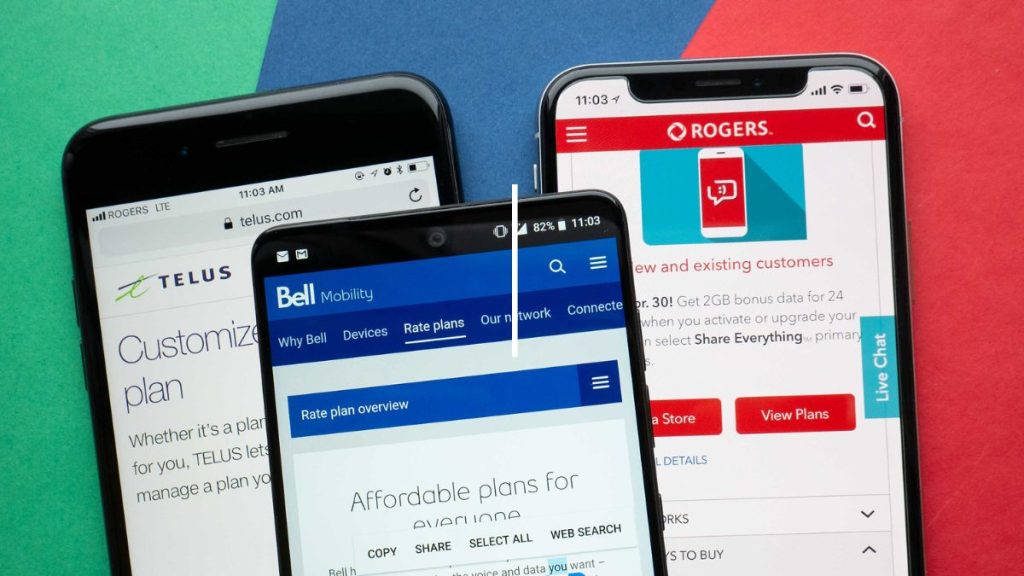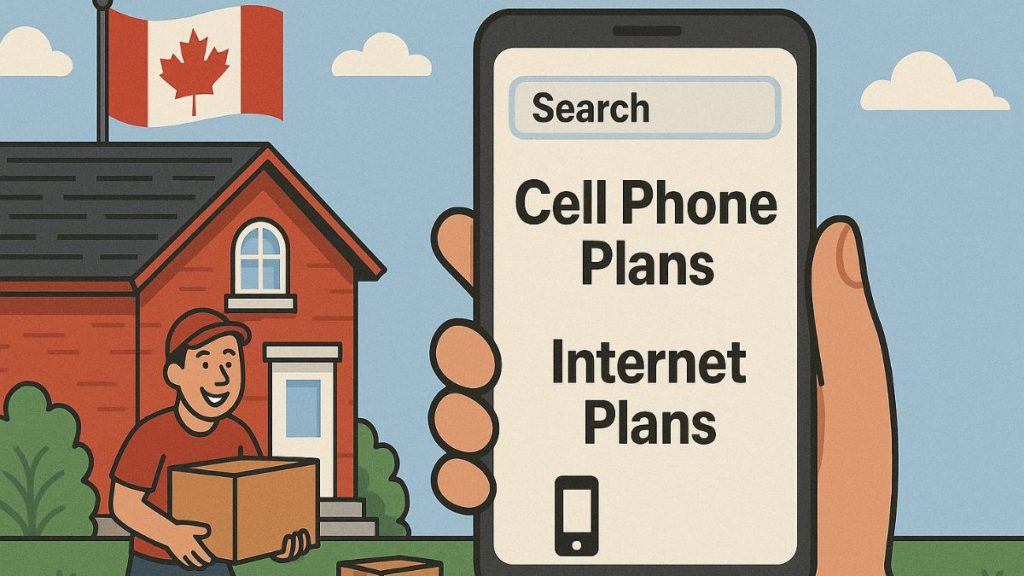Choosing a cell phone or Internet plan when you arrive in Canada is often complicated. First of all, it’s hard to find your way around with over 400 different operators and providers. Then there is the question of how to pay. For many years, migrants have had difficulty subscribing to a service due to the lack of a Canadian credit card. On the other hand, you also have to consider the particular geography of Canada, especially if you plan to settle in a region. In this guide, we will detail the steps to follow in order to create a bank account in Canada from a foreign country, and how to access a credit card and make your payments quickly after your arrival. We will also see which are the different Canadian providers and operators, what you should take into account, as well as the different tips to know in order to make the most of your package while saving money.
Is a credit card required to pay in Canada?
You can pay your cell phone or internet bill in different ways. You can pay from your bank account or by credit card. You can also pay by check, or even transfer money from your account from an ATM. Several ways are possible. However, paying by direct debit or credit card has many advantages.
Beyond being able to manage your accounts from your computer or an application, having a bank account and a credit card in Canada allows you to easily open a line if the operator asks for this information. On the other hand, direct debit allows you to avoid a $5 surcharge with some operators, while paying by credit card entitles you to cash back and gives you points to convert into gifts.
How do I open a bank account and obtain a credit card from abroad?
In Canada, banking institutions such as the Caisses Desjardins allow you to open an account from abroad by visiting this page. Once you arrive in Canada, all you have to do is go to the nearest Desjardins branch to activate your bank account in person.
Once this is done, you will be able to access a payment card, and above all, you will have the possibility of obtaining your precious sesame, a credit card. Of course, there are many types of credit cards available, from those that are only used to pay with no credit to cards that offer many more services and loyalty rewards.
What are the Canadian operators, and which foreign operators can we compare them to?
It is difficult for a migrant to know which operator to choose. Between the major players and the independent operators, there are hundreds of offers available. Don’t worry about that, PlanHub‘s comparator is a powerful tool updated in real time that will suggest you the best cell phone plans and Internet plans near you. Simply enter your postal code to see all the offers near you. But before you use our tool, here are some tips and information to help you find the best plan for you.
We have four historical operators: Bell, Rogers, Telus and Videotron.
Bell: Bell is the oldest Canadian operator. It can be compared to companies like AT&T or Verizon in the United States, Orange in France, Deutsche Telekom in Germany, NTT Docomo in Japan, and to a lesser extent to Maroc Télécom or Algérie Télécom which are more recent state-owned companies. Bell offers many packages, many of which are affordable, while the most expensive ones cost over $100.
Rogers and Telus: These two operators are as important as Bell in terms of network and service. They offer similar services in telephony by having both deployed a 5G network. Their Internet offer based on fiber is also similar in terms of speed. These two operators therefore differ in terms of tariffs, reputation, and the regions they cover. They can be compared to operators like SFR and Bouygues Telecom in France, Verizon in the United States, Vodafone in Germany or Orange and Inwi in the Maghreb countries.
Videotron: Originally from Quebec, Videotron is a company owned by media giant Quebecor. Videotron focuses on more affordable rates, and has excellent customer service available by phone. It has also deployed a 5G network and is the only one to use cable rather than fiber for Internet. Videotron is a bit different, it would be a mix between Free and Bouygues Telecom for France. However, it distinguishes itself in Quebec by offering Internet, television and telephony, while Telus and Rogers only offer cellular and telephone packages.
Who are the independent operators?
It is important to know that some of them belong to historical operators.
Some players are also larger or government owned in some provinces. SaskTel, for example, is an operator created by the Saskatchewan government. On the other hand, Quebec has the Internet provider Cogeco, which, without reaching the financial weight of an incumbent operator, is still quite important and even owns some media.
For the rest, there are many providers who offer rates that are often more attractive. They make up for their costs by providing customer support from Facebook, or by operating solely from the Internet. On the other hand, they can distinguish themselves by their communication, their flexibility to change plans, transfer data to another user or keep unused data. However, they all have in common that they use the Internet lines and cellular networks set up by the historical operators. They therefore offer quality network coverage as well as very good Internet speeds.
Facing the number of telecoms operating in Canada, the best way to know their reputation is to consult the reviews left on PlanHub by our users who are customers and sometimes former customers. On the other hand, our users also offer codes for promotions, so don’t hesitate to check them out.
Internet Plans:
Cell Phone Plans:
What are the types of cell phone and Internet plans in Canada?
Most cell phone plans in Canada are unlimited to Canada, but sometimes only to the province, so it is important to check this point.
Data is of course limited for cellular subscriptions. There are also two types of subscriptions. Those more accessible, but using the 4G network, and subscriptions containing more data often for 10$ more, and which work on 5G networks. There are also low-cost or a la carte subscriptions, but with limited call time.
Regarding internet plans, most plans above 30 Mbits are unlimited. Some very rare operators limit data, but they are marginal. Concerning the packages below a speed of 30 Mbits, generally sold under 30$, there are unlimited and limited data packages.
1 – Geography is important
Canada is a huge country, but very sparsely populated. Not all operators are available in all regions, and you may lose reception or switch to another network if you leave your geographical area.
The best thing to do is to choose an operator that will cover your living area. To this end, PlanHub has set up a tool to find out which operators operate in your geographical area. Our tool is updated in real time, and all you have to do is enter your postal code to find out who the operators are and their rates in ascending order.
2 – Bundle your plans
Operators offer discounts if you decide to subscribe to a package that includes internet and cell phone. On the other hand, if you have children or come with a partner, discounts may also apply if you choose to add other lines. For example, if you choose a $65 package with 25 GB of data, the second and subsequent packages will be billed at $40 and will each include the same amount of data as the reference package, i.e. 100 GB in total for four people.
3 – Opt for automatic payment
Some operators like Telus may charge $5 more if you don’t opt for direct debit. In case you’re not familiar with this method, it consists of your operator taking the amount you owe them each month on a specific date from your bank account or credit card. If the payment is made via a credit card, it may entitle you to discounts or rebates in the future. The other difference between your bank account and your credit card is that you must have sufficient funds if the payment is made from your bank account. If you choose to pay by credit card, the charge is made even if you do not have the funds, but it is important to understand that you have until the end of the month to pay off your credit.
Conclusion
By the end of this guide, you should know more about Canadian telecom. There are of course other topics that we haven’t covered, but we felt it was important to put together the essentials. In order to learn more about the subject and to choose your operator and your provider according to your region, we invite you to consult our complete guides on how to choose a cell phone plan or Internet plan in Canada.










